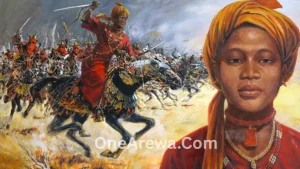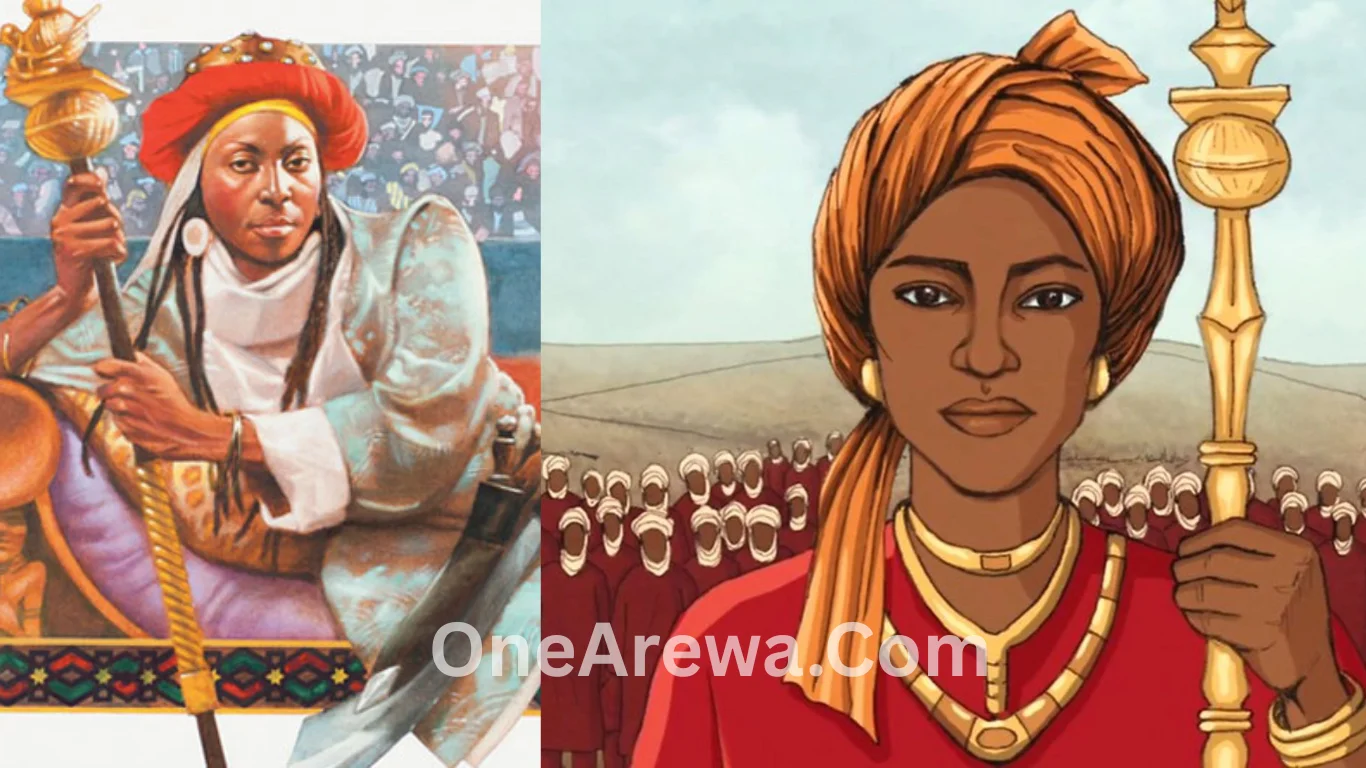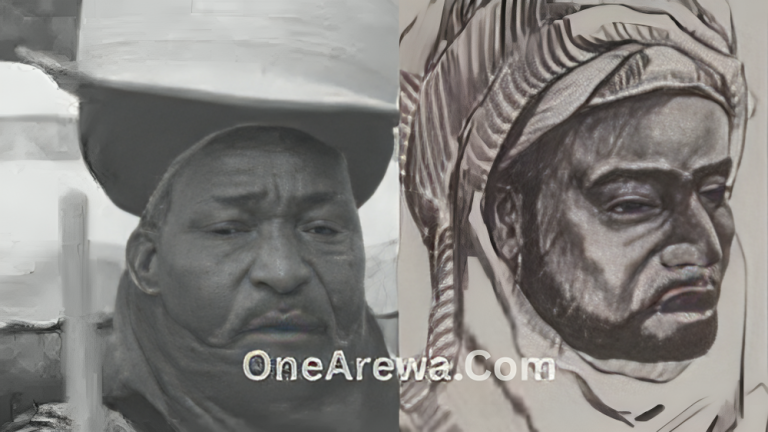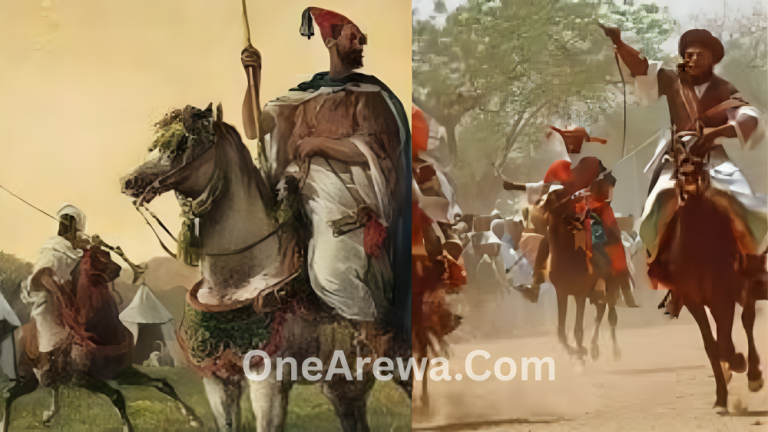Queen Amina of Zazzau: Nigeria’s Legendary Warrior Queen Who Built an Empire
Queen Amina of Zazzau: Nigeria’s Legendary Warrior Queen Who Built an Empire
| Fact | Details |
|---|---|
| Full Name | Aminatu (Queen Amina) |
| Born | Around 1533 |
| Died | 1610 (aged 77) |
| Reign | 1576 – 1610 (34 years) |
| Kingdom | Zazzau (now Zaria, Northern Nigeria) |
| Parents | King Nikatau (father) and Queen Bakwa Turunku (mother) |
| Siblings | Brother Karama and sister Zaria |
| Early Role | Named Magajiya (Heir Apparent) at age 16 |
| Military Leadership | Led an army of 20,000 soldiers, personally commanding battles |
| Conquests | Expanded Zazzau borders north to Nupe and south to Jukun kingdoms, controlled key trade routes |
| Innovations | Introduced protective armor; built defensive city walls called “Ganuwar Amina” |
| Marital Status | Refused marriage and children despite many suitors |
| Death | Killed in battle near Altagara, Bida in 1610 |
| Legacy Title | “Amina, rana de Yar Bakwa ta San” (woman as capable as a man) |
| Honors | Schools, university dormitories, and a statue at the National Arts Theatre in Lagos, named after her |

Queen Amina of Zazzau: Early Life and Family Background
Queen Amina of Zazzau, also known as Aminatu, was born around 1533 into the royal family of the Zazzau Kingdom (present-day Zaria in Northern Nigeria).
She was the eldest daughter of King Nikatau and Queen Bakwa Turunku, both influential rulers in Hausa history.
Amina had two siblings: a brother named Karama, who later became king, and a sister named Zaria, after whom the ancient city of Zazzau is believed to have been named.
Her lineage included powerful leaders; her grandfather was King Sarkin of Nohir, and her grandmother was Marka, who once caught young Amina wielding a dagger, a sign of her early warrior instincts.
From a young age, Amina showed political interest and leadership skills, often sitting on her grandfather’s lap during official state meetings.
Despite the traditional expectations of royal women, Amina defied norms. While she joined her mother in domestic and royal duties, she also trained with the royal guards, mastering military skills.
At 16 years old, when her mother became queen, Amina was appointed Magajiya (Heir Apparent), marking the beginning of her journey toward the throne.

Queen Amina of Zazzau: Training and Rise to Power
As a young royal, Queen Amina of Zazzau immersed herself in intense military training with the royal guards, sharpening her skills in warfare and strategy.
Her courage and determination stood out, even among male warriors.
Though she received many marriage proposals, including extravagant offers from rulers like the Emir of Kano, who gifted her 50 bags of white and blue cloth, 50 female slaves, and 50 male slaves, Amina refused to marry or have children, choosing instead a life dedicated to leadership and conquest.
After the death of her parents in 1566, her brother Karama ascended the throne as king. During his reign, Amina rose to prominence as the lead warrior of Zazzau’s army.
For ten years, she built a formidable reputation through her successful military campaigns, gaining personal wealth, loyalty from her soldiers, and respect across the region.
Her consistent victories and leadership prowess made her an icon.
When her brother died in 1576, Amina was crowned Queen of Zazzau, becoming the kingdom’s first female ruler and one of the most legendary warrior queens in African history.

Queen Amina of Zazzau’s Military Career and Leadership
Upon becoming Queen in 1576, Queen Amina of Zazzau quickly established herself as a fearless and strategic military leader.
Within just three months of ascending the throne, she launched a series of military campaigns aimed at expanding and securing Zazzau’s borders.
Her goal was to ensure safe passage for Hausa traders and to dominate key trade routes across the region.
Queen Amina personally commanded an army of 20,000 soldiers, leading them into battle across what is now Northern and Central Nigeria.
She conquered territories in the Nupe and Jukun kingdoms, as well as Kasashen Bauchi, extending the influence of Zazzau across a vast area.
These conquests helped establish Zazzau as a major commercial and political power, linking trade routes between western Sudan, Egypt, and Mali.
One of her most notable military innovations was the introduction of protective armor for her warriors, enhancing the strength and survival of her army.
As a ruler, she collected tributes from conquered regions, including kola nuts and male slaves, in line with the customs of the time.
Queen Amina also ordered the construction of fortified walls around conquered cities and military camps.
These walls, known today as “Ganuwar Amina” (Amina’s Walls), still stand in parts of Northern Nigeria as enduring symbols of her strength, foresight, and influence.
Under her leadership, the Zazzau Empire thrived militarily, economically, and politically, and Queen Amina secured her legacy as one of Africa’s most powerful warrior queens.

Queen Amina of Zazzau: Achievements and Legacy
Queen Amina of Zazzau reign of 34 years (1576–1610) left an indelible mark on the history of Northern Nigeria and the Hausa people.
Her achievements extended beyond military conquest to include innovations in governance, trade, and urban development.
By expanding Zazzau’s territory, she secured and controlled vital trade routes connecting Western Sudan, Egypt, and Mali, boosting the region’s economic prosperity.
Her introduction of protective armor to the army enhanced the military effectiveness of her forces and demonstrated her forward-thinking leadership.
The walls she commissioned around conquered cities and military camps, known locally as the “Ganuwar Amina”, stand today as enduring monuments of her reign, symbolizing security and strength.
Queen Amina also challenged traditional gender roles by refusing marriage and children to focus on leadership and military success, earning her the title “Amina, rana de Yar Bakwa ta San”, meaning “Amina, daughter of Nikatau, woman as capable as a man.”
Her legacy is honored in modern Nigeria through educational institutions such as Queen Amina College in Kaduna, female dormitories named Queen Amina Hall at the University of Lagos and Ahmadu Bello University, and a statue at the National Arts Theatre in Lagos State.

Queen Amina of Zazzau: Death and Legacy
Queen Amina of Zazzau died in battle in 1610 at the age of 77, near Altagara, close to Bida.
Her death marked the end of a remarkable 34-year reign during which she transformed the Zazzau kingdom into a powerful and strategically fortified state.
Though she fell in combat, her legacy lived on, symbolizing courage, leadership, and female empowerment.
Queen Amina’s military innovations, such as the introduction of protective armor and the construction of defensive city walls known as the “Ganuwar Amina” (Amina’s walls), have left lasting physical landmarks in northern Nigeria.
Her expansions secured vital trade routes, boosting the kingdom’s economic and political influence.
In contemporary Nigeria, she is celebrated as “Amina, rana de Yar Bakwa ta San”, meaning “Amina, daughter of Nikatau, woman as capable as a man.”
Numerous institutions and monuments honor her legacy, including Queen Amina College in Kaduna, female dormitories at the University of Lagos and Ahmadu Bello University, and a statue at the National Arts Theatre in Lagos State.
Her story continues to inspire generations, embodying strength, resilience, and the power of women in leadership.
FAQs
1: Who was Queen Amina of Zazzau?
Queen Amina was a 16th-century Hausa warrior queen who ruled the city-state of Zazzau (now Zaria) in Northern Nigeria for 34 years, from 1576 to 1610.
2: What was Queen Amina’s family background?
She was born around 1533 into the royal family; her father was King Nikatau, her mother Queen Bakwa Turunku, and she had a brother, Karama, and a sister, Zaria.
3: How did Queen Amina prepare for leadership?
From a young age, Amina was trained as a warrior, often practicing with the royal guards, and was named Magajiya (Heir Apparent) at age 16.
4: What are Queen Amina’s major military achievements?
She personally led an army of 20,000 soldiers, expanding Zazzau’s borders through strategic battles, introducing armor, and building fortified walls known as “Ganuwar Amina.”
5: Did Queen Amina marry or have children?
No, she refused all marriage proposals and did not have children, focusing instead on her role as a warrior and leader.
6: What was the significance of the walls Queen Amina built?
The defensive walls, called “Ganuwar Amina,” protected conquered cities and military camps, and many still stand today in Northern Nigeria as a testament to her reign.
7: How did Queen Amina contribute to trade?
She secured and dominated important trade routes connecting Western Sudan, Egypt, and Mali, enhancing the wealth and influence of Zazzau.
8: How did Queen Amina die?
She died in battle around 1610 near Altagara, close to Bida.
9: How is Queen Amina remembered today?
She is celebrated as a symbol of strength and female empowerment in Nigeria, with schools, university halls, and statues named after her.
10: What is Queen Amina’s legacy?
Queen Amina remains an iconic figure for bravery, military innovation, and leadership, inspiring generations of Nigerians and women worldwide.
Check Out: Emir Abubakar of Hadejia: The Visionary Leader Behind Hadejia’s Cultural and Community Development

In conclusion
Queen Amina of Zazzau stands as one of Nigeria’s most legendary figures, a warrior queen whose fearless leadership, military innovations, and strategic prowess expanded and secured her kingdom’s influence for over three decades.
Born into royalty around 1533, she defied traditional roles by rejecting marriage to fully dedicate herself to protecting and growing her realm.
Her legacy endures not only in the historic walls she built and the trade routes she controlled but also in the lasting cultural inspiration she provides as a symbol of strength, courage, and female empowerment in Nigeria and beyond.
Check Out: Shehu Muhammad al-Amîn al-Kanemi (1776 – 8 June 1837)
Check Out: Shehu Usman Dan Fodio: The Islamic Scholar Who Founded the Sokoto Caliphate (1754–1817)








